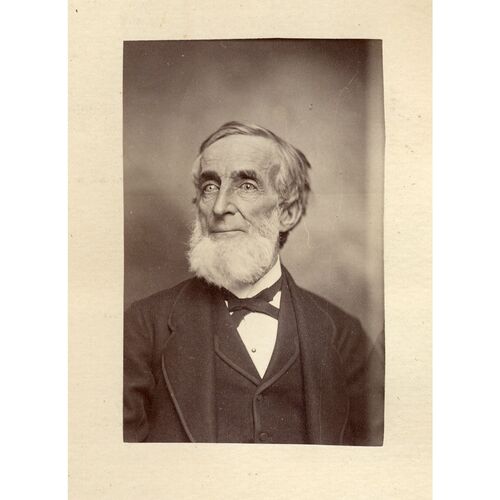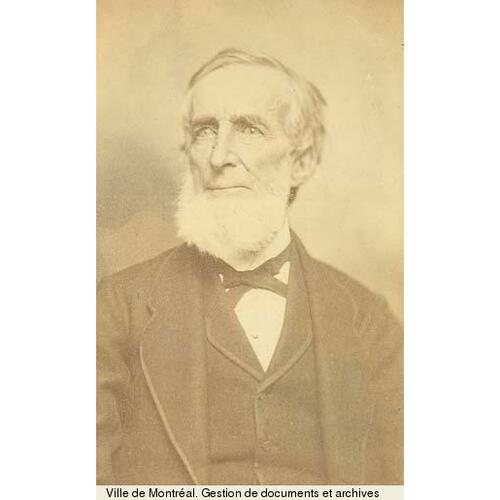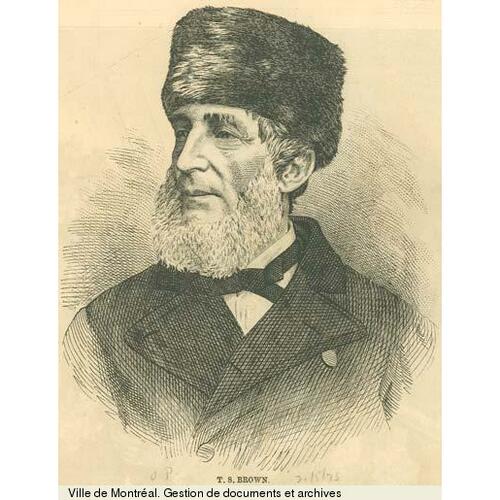BROWN, THOMAS STORROW, hardware merchant, journalist, Patriote, and writer; b. in 1803 at St Andrews, N.B., son of Henry Barlow Brown, a merchant, and Rebecca Appleton; m. in 1829 Jane Hughes (d. 1833), and m. secondly in 1860 Hester Livingstone; d. 26 Dec. 1888 in Montreal, Que.
Thomas Storrow Brown’s father, a loyalist who had taken refuge in New Brunswick in 1776, returned to the United States in 1811, settling in Woodstock, Vt. In 1818, Thomas Storrow Brown went to Montreal to live with his uncle Thomas Storrow, who found him work with the ironmonger J. T. Barrett, on Rue Saint-Paul. In 1825 Brown is believed to have opened a hardware store on the same street, probably with the assistance of the Barrett family. He does not seem to have been successful, for after being in partnership with François-Benjamin Blanchard for some time, he went bankrupt in 1835. He then turned to land speculation. In 1833, with Jacob De Witt*, Brown had taken part in negotiations for the incorporation of the City Bank, and in the organization of the Banque du Peuple, of which he was a director. In 1834, when the cholera epidemic was raging in Montreal, Brown served on a committee to help the victims; it set up a hospital and provided funds to cover initial expenses.
It is difficult to determine the date at which Brown joined the Patriote party. He allegedly belonged to the Society of the Friends of Ireland, an organization which helped found in 1828 a Montreal newspaper, the Irish Vindicator and Canada General Advertiser; in 1832 it became the Vindicator and Canadian Advertiser [see Edmund Bailey O’Callaghan*]. But, if this is true, it is surprising that his name is not on the list of militant Patriotes who organized support for Daniel Tracey* in the election in the west riding of Montreal in 1832. Perhaps at that date Brown, like his partner Blanchard who would also become a Patriote, was supporting the Tory Stanley Bagg. But from 1836 Brown committed himself openly. He worked with the most radical members of the Patriote party, some of whom were anglophones; these radicals were dissatisfied with the control exercised by the most powerful men of affairs, and were receptive to either American democratic ideas or the views of the radicals in England. In 1836–37 Brown contributed to the Vindicator, and forwarded a dozen or so open letters, under the pseudonym L.M.N., to the Express (New York). In 1837, he preached revolution to the Fils de la Liberté, and when the members of the Doric Club sacked the offices of the Vindicator during a riot on 6 November, Brown was seriously wounded in one eye.
Ten days later he left Montreal for Varennes, after the government had issued warrants for the arrest of Patriote leaders. Accompanied by Dr Eugène-Napoléon Duchesnois, Dr Henri-Alphonse Gauvin, and Rodolphe Des Rivières*, he then set out for Saint-Charles where he arrived just as an entrenched camp was being established. Brown made a great impression since he had just come from the city and was practically a war casualty. With the approval of Louis-Joseph Papineau*, he was appointed general, but in reality he did not have the makings of a leader, lacking both a sense of organization and the ability to inspire his men. This lack did not prevent him from forging blithely ahead, certain of victory. However, on 25 November when the fight against the government forces under George Augustus Wetherall* had scarcely begun, Brown left in search of reinforcements, disappearing ingloriously from the battlefield. He went to Saint-Denis before fleeing to the United States, reaching Berkshire, Vt, on 10 December.
He was imprisoned for nearly a month for debts contracted in Canada, and then apparently experienced difficulty in integrating himself into the group of political refugees. In April 1838 he published a long article on the rebellion in the Vermonter (Vergennes, Vt) and shortly after left for Florida where he edited the Florida Herald in Key West. When this venture failed, he found himself a post as an auditor but when amnesty was proclaimed in 1844, he returned to Montreal and went back to hardware. Two years later, Louis Perrault* wrote to Edmund Bailey O’Callaghan: “T. S. Brown is a clerk at [Charles Wilson*’s] hardware store. He is behaving properly now. He will make his way if he doesn’t take to drink again.” On the evidence of the Montreal directory, Brown apparently set up his own business on Rue Saint-Paul about 1854. In 1862 with William Bristow* and George Sheppard, he was appointed to the Financial and Departmental Commission “to enquire into the prevailing mode of keeping the Public Accounts of this Province, and the items of receipt and disbursement of money by every department of the public service, and how the same have been and are now checked and audited.” Two years later he left the hardware store following his appointment as official assignee responsible for applying the new bankruptcy law. He kept this post until he became completely blind, some ten years before his death.
[In addition to articles and letters published in various newspapers in the 1830s, Thomas Storrow Brown wrote a number of pamphlets. Some of these related to the events occurring in 1837–38: Brief sketch of the life and times of the late Hon. Louis-Joseph Papineau ([Montreal, 1872]; 1837; my connection with it (Quebec, 1898). Others are linked to his role in public life: A history of the Grand Trunk Railway of Canada, compiled from public documents (Quebec, 1864); Montreal fifty years ago (Montreal, 1868). In his capacity as a commissioner, he co-authored Can., Prov. of, Financial and Departmental Commission, Report (2v., Quebec, 1863–64). He also wrote a more personal short book entitled Strong drink, what it is and what it does (Montreal, 1884). f.o.]
ANQ-Q, AP-G-417; QBC 25, Événements de 1837–1838. ASQ, Fonds Viger-Verreau, Sér. O, 0139–52. McGill Univ. Libraries (Montreal), Dept. of Rare Books and Special Coll., ms coll., CH443.RBR box. PAC, MG 24, B2; RG 31, A1, 1831, Montreal. An alphabetical list of the merchants, traders, and housekeepers, residing in Montreal; to which is prefixed, a descriptive sketch of the town, comp. Thomas Doige (Montreal, 1819). Borthwick, Hist. and biog. gazetteer, 277–79. Fauteux, Patriotes. John Boyd, “Thomas Storrow Brown et le soulèvement de 1837 dans le Bas-Canada,” Rev. canadienne, nouv. sér., 18 (juillet–décembre 1916): 50–69, 110–29. Émile Chartier, “Après ‘l’Affaire de Saint-Denis,’ 1er–12 décembre 1837, d’après un mémoire de Brown,” BRH, 56 (1950): 130–47.
Cite This Article
Fernand Ouellet, “BROWN, THOMAS STORROW,” in Dictionary of Canadian Biography, vol. 11, University of Toronto/Université Laval, 2003–, accessed April 27, 2025, https://www.biographi.ca/en/bio/brown_thomas_storrow_11E.html.
The citation above shows the format for footnotes and endnotes according to the Chicago manual of style (16th edition). Information to be used in other citation formats:
| Permalink: | https://www.biographi.ca/en/bio/brown_thomas_storrow_11E.html |
| Author of Article: | Fernand Ouellet |
| Title of Article: | BROWN, THOMAS STORROW |
| Publication Name: | Dictionary of Canadian Biography, vol. 11 |
| Publisher: | University of Toronto/Université Laval |
| Year of revision: | 1982 |
| Access Date: | April 27, 2025 |


![[Thomas Storrow Brown] [image fixe] / Studio of Inglis Original title: [Thomas Storrow Brown] [image fixe] / Studio of Inglis](/bioimages/w600.4501.jpg)



